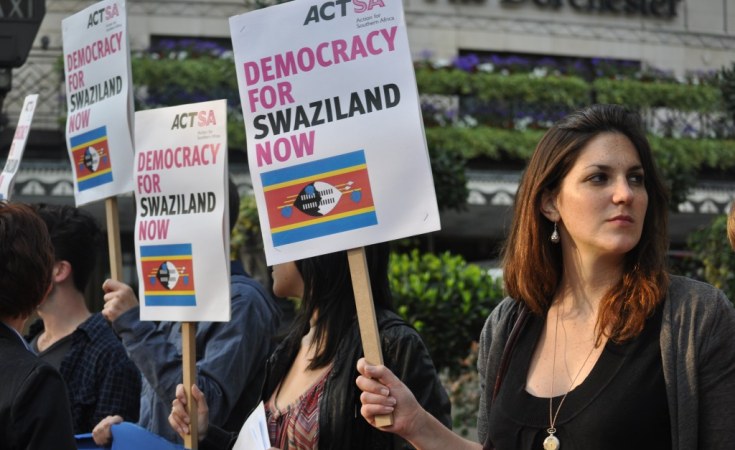Despite a recent increase in revenue, Swaziland's population continues to suffer under a faltering economy and unaccountable government.
The Swazi economy is in dire straits despite some recent improvements. According to some estimates, 40% of the workforce is unemployed, nearly two thirds of the population live under the poverty line, and almost 30% of people suffer from food insecurity.
Swaziland's economy has been in a particularly serious crisis the past few years, ever since its revenue from the Southern African Customs Union (SACU) - a regional bloc from which Swaziland receives two thirds of its revenue - fell by 60% following the global financial downturn.
Revenue from SACU is expected to pick up significantly in 2012/13 but then fall again in 2013/14. More fundamentally, as long as Swaziland remains so dependent on the SACU, its 1.3 million inhabitants will rest uneasily.
Even King Mswati III, Swaziland's head of state and Africa's last remaining absolute monarch, revealed his concerns to parliament last week, warning that "alternate income sources are urgently required".
Living like a king
Yet for many, it is Mswati himself that is the greatest obstacle to economic recovery. Mswati is a polygamist executive monarch whose budget is not debated by parliament. His late father, King Sobhuza II, banned political parties in 1973. And despite a new constitution adopted in 2005, political parties are still not allowed to contest for elections in the kingdom.
In 2011, Mswati's efforts to secure a R2.4 billion ($270 million) loan from South Africa failed after he refused to meet certain conditions, such as basic political reforms.
The royal family is also notorious for its extravagant spending. And many believe the economic situation will always remain precarious as long as the royal family's budget is not kept in check.
"Under the current political dispensation, it's difficult to regulate the expenditure around the institution of the monarchy", Vincent Ncongwane, secretary general of the banned Trade Union Congress of Swaziland (TUCOSWA), told Think Africa Press.
Ncongwane expressed his disappointment that as soon as the country received a windfall from SACU, the extravagance of the royal family immediately resurfaced, if it had stopped at all during the economic crisis. "We're seeing the celebrations of the king's birthday and the unjustified trips by the royal family which takes us back to square one", Ncongwane lamented.
Provoking the public
When the economy hit rock bottom in 2011, trade unions blamed the government and took to the streets demanding that the executive - led by Mswati's appointee, Barnabas Sibusiso Dlamini - relinquished power. The government retaliated with repressive measures and police brutality while ignoring the public outcry.
Things further heated up when the government invited the International Monetary Fund (IMF) to Swaziland, ostensibly to help get loans from institutions such as the African Development Bank (AfDB).
But IMF officials added met an impasse when they suggested pay cuts for public servants' salaries, which currently total up to 18% of GDP - one of the highest rates of bureaucratic expenditure in the region. Politicians eventually accepted a 10% reduction, but civil servants refused.
The IMF walked out leaving Majozi Sithole, Swaziland's minister of finance, to shrug off the dispute, telling a local newspaper that the kingdom's fiscal turnaround had proven the IMF wrong.
But vast sections of the Swazi public are exasperated by the manner in which Mswati and his government are conducting themselves. Sibongile Mazibuko, president of the Swaziland National Association of Teachers (SNAT), expressed her discontent at the regime and told Think Africa Press that public sector unions had no choice but to table fresh salary demands on the government.
"With the aggressive tax collection and salary freeze, public servants are really pushed into a corner", said Mazibuko.
She also attributed the closure of many companies in the country to the fact that the government is taxing its citizens to the bone while the economy remains stagnant.
Last year, the government introduced VAT while intensifying its collection of company taxes, resulting in many enterprises closing shop. At the same time, economic growth decreased from 0.7% in 2011 to 0.3% in 2012.
"People are spending less and less because of the high taxes, resulting in companies closing down", she said.
Sharing the pie
The monarchy is aware of the public outcry over tax policies, however, and has promised that the government will review them this year. Independent economist Dumisani Sithole welcomed the news of a tax review, whilst lamenting the fact that the standard of service delivery did not justify the taxes paid to the government.
"Education is very expensive in the country yet people pay high taxes", he said. "The taxes are very high yet the burden for services keeps increasing."
More specifically, Sithole hopes that the bracket of people exempt from income tax will be expanded. "Currently people who are earning R3,000 ($340) and less are exempt from PAYE [Pay As You Earn]. I hope they will increase the bracket to those earning R5,000 ($570) and less", he said.
Although government may be enjoying an increase of funding this year, the Swazi economy remains under the destabilising thumb of an unaccountable government and overly profligate monarch.
And as long as the status quo remains and workers and an increasingly impoverished public are forced to demand a larger slice of the economic pie, unrest in southern Africa's deeply polarised kingdom may well increase.
Twitter @MantoeP


